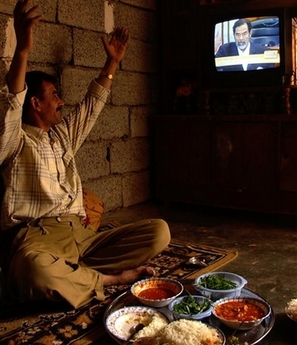Saddam verdict opinion differs worldwide
(AP)Updated: 2006-11-06 06:53
Saddam Hussein's death sentence was celebrated by some on Sunday as justice deserved or even divine, but denounced by others as a political ploy two days before critical US midterm congressional elections.
|
|
The European Union welcomed the verdict but said Saddam should not be put to death. At the Vatican, Cardinal Renato Martino, Pope Benedict XVI's top prelate for justice issues, called the sentence a throwback to "eye for an eye" vengeance.
"This is not the way to present the new Iraq to the world, which is different from Saddam, who was behind hundreds of thousands of deaths as well as death penalty sentences," said Hands Off Cain, an Italian organization working to rid the world of capital punishment.
Islamic leaders warned that executing Saddam could inflame those who revile the US, undermining President Bush's policy in the Middle East and inspiring terrorists.
"The hanging of Saddam Hussein will turn to hell for the Americans," said Vitaya Wisethrat, a respected Muslim cleric in Thailand, which has its own Islamic insurgency in the country's south.
"The Saddam case is not a Muslim problem but the problem of America and its domestic politics," he said. "Maybe Bush will use this case to tell the voters that Saddam is dead and that the Americans are safe. But actually the American people will be in more danger with the death of Saddam."
Praising the Iraqi judiciary for its independence, the White House denied arranging for the verdict to be announced just two days before pivotal elections in which Democrats are fighting for control of Congress.
"The idea is preposterous," said Tony Snow, Bush's spokesman.
Yet there was a touch of contempt as well, reminiscent of the international response when the United States failed to find the weapons of mass destruction Bush insisted had made Saddam such a threat.
Intervening militarily was "a grave error," said Spanish Prime Minister Jose Luis Rodriguez Zapatero, whose country withdrew its troops from Iraq, contending that conditions there have worsened since the U.S.-led invasion.
Although some voiced doubts that Saddam would actually be hanged, the International Federation for Human Rights denounced the death sentence, warning that it "will generate more violence and deepen the cycle of killing for revenge in Iraq." The Council of Europe called it "futile and wrong" to execute Saddam.
Louise Arbour, the U.N. high commissioner for human rights, urged Iraq to ensure a fair appeals process and to refrain from executing Saddam even if the sentence is upheld.
In Pakistan, an opposition religious coalition claimed American forces have caused more deaths in Iraq in the past 3 1/2 years than Saddam did during his 23-year rule, and insisted Bush should stand trial for war crimes.
"Who will punish the Americans and their lackeys who have killed many more people than Saddam Hussein?" asked Hafiz Hussain Ahmed, a senior lawmaker from the Mutahida Majlis-e-Amal coalition, which is critical of Pakistan's military cooperation with the United States.
In the Arab world, some Muslims saw the sentence as divine retribution, but others decried it as a farce.
"Saddam is being judged by traitors, Americans and Iranians, and those who came on the backs of American tanks," said Mahmoud al-Saifi of the Arab Liberation Front.
Iran, which fought an eight-year war against Saddam's Iraq and is a bitter opponent of the United States, praised the death sentence and said it hoped that Saddam - denounced by one lawmaker as "a vampire" - still would be tried for other crimes.
Key US allies - including Britain and Australia - welcomed Sunday's verdict, which had been widely expected.
"Appalling crimes were committed by Saddam Hussein's regime. It is right that those accused of such crimes against the Iraqi people should face Iraqi justice," British Foreign Secretary Margaret Beckett said in a statement.
Amnesty International questioned the fairness of the trial, and international legal experts said Saddam should be kept alive long enough to answer for other atrocities.
"The longer we can keep Saddam alive, the longer the tribunal can have to explore some of the other crimes involving hundreds of thousands of Iraqis," said Sonya Sceats, an international law expert at the Chatham House foreign affairs think tank in London.
"The problem really is that this tribunal has not shown itself to be fair and impartial ¡ª not only by international standards, but by Iraqi standards," she said.
Chandra Muzaffar, president of the Malaysian-based International Movement for a Just World, also voiced concerns that Saddam's trial "violated many established norms of international jurisprudence."
Even so, "Saddam was undoubtedly a brutal dictator, and even though I wouldn't subscribe to the death penalty, he deserves to be punished severely for the enormity of his crimes," he added.
Konstantin Kosachyov, the Kremlin-allied head of the international affairs committee in Russia's State Duma, or lower house of parliament, said the sentence would deepen divisions in Iraq.
But Kosachyov expressed doubts that Saddam would actually be executed.
The verdict, he said, was mostly symbolic - "retribution that modern Iraq is taking against Saddam's regime."
|
||
|
||
|
|
